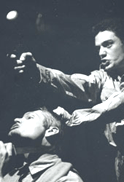Catherine Zimdahl – September 6 2020
World Suicide Prevention Day – September 9
 Catherine is a playwright, screenwriter and visual artist. Her plays include Gifted, Step Up Stare Down, Deviant Art for the Degenerate (film adaptation nominated for IF Best Unproduced Screenplay), HereNowThenThere, Family Running for Mr Whippy, Left Breathless A Question, The Fox, A World into a Child, A Child into the World and Moonfleet. Her film credits include Sparks and Life on Earth as I Know It. Catherine studied screenwriting at the Australian Film, Television and Radio School where she was the recipient of the Qantas Travel Award graduate prize. Catherine is a member of 7-ON Writers Theatre. No Nudity, Weapons or Naked Flames, a book of monologues published by Federation Press, includes three of Catherine’s monologues.
Catherine is a playwright, screenwriter and visual artist. Her plays include Gifted, Step Up Stare Down, Deviant Art for the Degenerate (film adaptation nominated for IF Best Unproduced Screenplay), HereNowThenThere, Family Running for Mr Whippy, Left Breathless A Question, The Fox, A World into a Child, A Child into the World and Moonfleet. Her film credits include Sparks and Life on Earth as I Know It. Catherine studied screenwriting at the Australian Film, Television and Radio School where she was the recipient of the Qantas Travel Award graduate prize. Catherine is a member of 7-ON Writers Theatre. No Nudity, Weapons or Naked Flames, a book of monologues published by Federation Press, includes three of Catherine’s monologues.

Sample image
A Day Too Great
Full length; 3 female, 3 male (multiple roles)
Amateur License Request Form: www.rgm.com.au/forms/AmateurLicense
Joss is 22 years old. She’s tried and failed to kill herself, a situation she insists was simply a momentary “sigh for help” but for those close to her there is sufficient reason to be alarmed. A Day Too Great charts the night of her suicide watch. In her flat, her boyfriend and best friend are with her – watching, waiting, increasingly terrified and exhausted. Through the night Joss’s impulse is to cut and crush those dearest to her, to cast out every demon thought, to wrestle with her murderous god as she tests the limits of love, spinning those in her orbit on a darkening trajectory … A Day Too Great examines the fragile bonds that hold us all in place, blowing away the comforting aphorisms and asks the question what part of the self needs to be killed in order to live?
 Clark in Sarajevo
Clark in Sarajevo
Australian Script Centre, 1998;
80 minutes; minimum 3 female, 3 male (45 roles)
Young adult – adult
Clark in Sarajevo is a surreal and poetic play that traces the journey of Clark Cant, a mild-mannered reporter, who in an effort to cast off his ordinariness reinvents himself as a war correspondent. He goes to Sarajevo in the middle of the siege, encountering lives distorted by war, stretched to the limits of their endurance. The play is about the gaze of the West as it follows Clark’s fall from a flat disengaged spectator/voyeur, to a man who comes to embody the complex emotions of an uncomprehending witness to a catastrophe; a play about human issues, not the external political issues of war.
